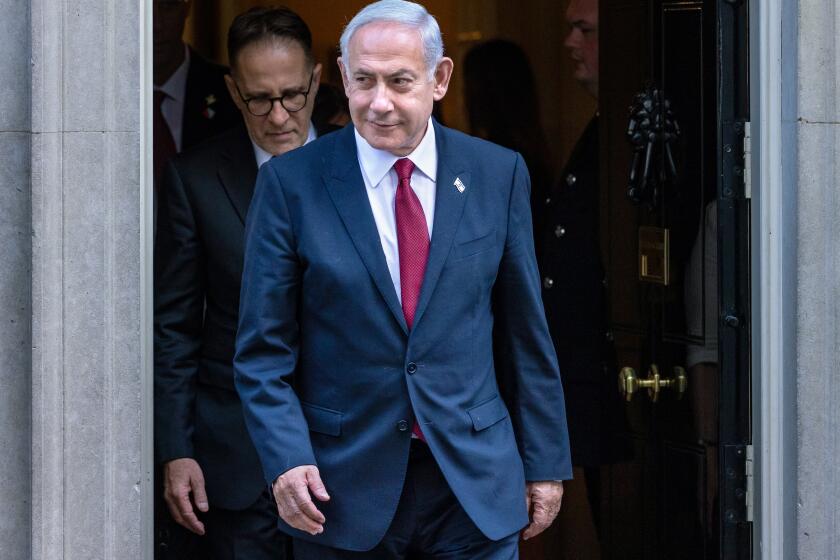Tensions ease after Netanyahu postpones judicial overhaul, but deadlock remains

- Share via
TEL AVIV — Political factions opposed to embattled Israeli Prime Minister Benjamin Netanyahu began setting up negotiating teams Tuesday after he paused a controversial judicial overhaul plan that had set off unprecedented street protests and a spiraling domestic crisis.
But a compromise seemed elusive and Netanyahu’s legacy was on the line in a standoff over the fundamental issue of what kind of country Israel should be — and positions appear only to have hardened. Three months of demonstrations against the overhaul plan intensified this week, and Israel’s main trade union declared a general strike, leading to chaos that shut down much of the country and threatened to paralyze the economy.
In a prime-time speech Monday night, Netanyahu acknowledged the divisions roiling the nation and announced a monthlong delay for the legislation. Within hours, analysts pointed out that Netanyahu’s firing of his defense minister Sunday night heightened the outrage and sank his approval ratings among his own Likud party — which left him with few choices.
“He understood that he’s in a dead end,” said Yohanan Plesner, president of Israel Democracy Institute. “And Netanyahu, who is very experienced, understood that now is the time for correction.”
In his address, Netanyahu said he wanted “to avoid civil war” and would seek a compromise with political opponents. He spoke after tens of thousands of people demonstrated outside the parliament building in Jerusalem.
His announcement appeared to calm some of the tensions that have fueled months of unrest. But it failed to address the underlying issues that have polarized Israelis. Netanyahu leads the most right-wing government in Israeli history, and his allies have vowed to enact the legislation.
If the Netanyahu government falls apart, it is unclear who would fill the void or what new unrest could be ignited.
“I feel relief but with doubt,” Fega Gutman, a Tel Aviv resident, said Tuesday. Netanyahu, Israel’s longest-serving leader, over the years “promised us a lot but didn’t always fulfill, unfortunately.”
The pause gave many Israelis time to consider the challenge ahead.
“I feel good today — everything calmed down from yesterday,” said Maor Daniel, who also is from Tel Aviv. “We have to figure out together how to fix the situation, how to live together.”
Some anti-government protesters stepped aside Tuesday, for the moment at least, but made clear their distrust of Netanyahu and his allies. A key group declared that it would hold a new protest later Tuesday and again Saturday night in Tel Aviv, which has been its practice over the last three months.
Israel’s longest-serving prime minister is out of tricks. His attempt at a judicial revolution has left Israelis feeling disenfranchised and desperate.
“The protesters who take to the streets are not stupid,” the group known as the Umbrella Movement of Resistance Against Dictatorship said in a statement. “Millions of citizens who have protested until now will not give up.”
A flurry of phone calls between rival opposition leaders followed Netanyahu’s announcement and lasted into Tuesday morning, with several working groups named as the protests subsided and Israel’s largest labor union called off its general strike.
“When there’s an opportunity to avoid civil war through dialogue, I, as prime minister, am taking a timeout for dialogue,” Netanyahu said in his speech. He vowed to reach a “broad consensus” during the summer session of parliament, which begins April 30.
The country’s figurehead president, Isaac Herzog, said pausing the legislative blitz was “the right thing” and offered to oversee the negotiating teams. He spoke in separate phone calls with Netanyahu, opposition leader Yair Lapid and National Union Party Chairman Benny Gantz, his office said.
The hilltop site, sacred to both Jews and Muslims, has been the scene of frequent clashes between Palestinian protesters and Israeli security forces.
“This is the time for frank, serious and responsible discussion that will lead urgently to calming spirits and lowering the flames,” Herzog said.
National Security Minister Itamar Ben-Gvir, an ultranationalist who has pushed for quick passage of the package, said it “”will pass,” though he would respect the delay. “No one will scare us,” he tweeted.
Critics say the judicial overhaul would hobble the country’s system of checks and balances. Protesters vowed to intensify their demonstrations.
The proposed changes would give Netanyahu, who is on trial on corruption charges, and his allies the final say in appointing the nation’s judges. It would also give parliament, which is controlled by his allies, authority to overturn Supreme Court decisions and limit the court’s ability to review laws.
Crisis in Israel deepens over the new government’s radical plans, which have alienated and dismayed Israelis and Jewish Americans alike.
Netanyahu has argued that the overhaul is needed to rein in a liberal and overly interventionist court of unelected judges. But his opponents say the package would concentrate too much power in the hands of Netanyahu’s allies. They also say that he has a conflict of interest as a criminal defendant.
Large swaths of Israeli society and governments around the world condemned the overhaul. Business leaders, top economists and former security chiefs have all come out against the plan, saying that it was pushing the country toward an autocracy. Fighter pilots and military reservists have threatened not to report for duty, and the country’s currency, the shekel, has tumbled in value.
Tens of thousands of people, largely secular, middle-class Israelis, have regularly joined mass protests against it.
The situation escalated Sunday night after Netanyahu abruptly fired Defense Minister Yoav Gallant, who had urged him to put his plan on hold, citing concerns about damage to the Israeli military.
Breaking News
Get breaking news, investigations, analysis and more signature journalism from the Los Angeles Times in your inbox.
You may occasionally receive promotional content from the Los Angeles Times.
Even with the big issues still outstanding, officials inside and outside Israel signaled relief that the pause in enacting the overhaul had bought some time. The Biden administration welcomed Netanyahu’s announcement, making its encouragement clear by dangling the prospect of an invitation for Netanyahu to the White House.
“I had a nice night of sleep last night, thank God,” U.S. Ambassador Tom Nides told Israel Army Radio. “This morning I’m optimistic and I applaud the move.”
More to Read
Sign up for Essential California
The most important California stories and recommendations in your inbox every morning.
You may occasionally receive promotional content from the Los Angeles Times.

















